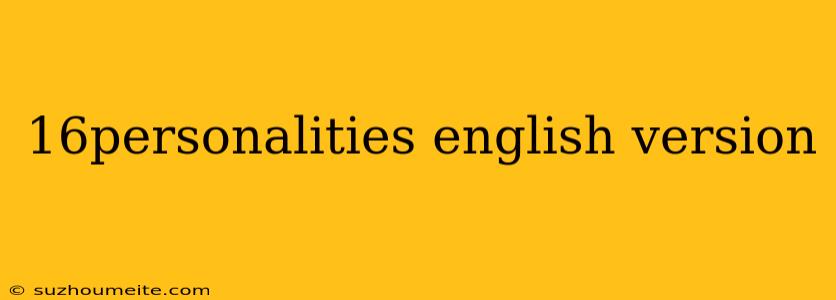Understanding Yourself: An Introduction to 16Personalities
Have you ever wondered why you react to certain situations in a particular way? Or why your friends and family members have different approaches to life? The answer lies in personality types. One of the most popular and widely used personality frameworks is the 16Personalities system, which offers insights into our strengths, weaknesses, and behavior patterns.
What is 16Personalities?
The 16Personalities system is based on the work of Isabel Briggs Myers and Katharine Cook Briggs, who developed the Myers-Briggs Type Indicator (MBTI). The system categorizes individuals into one of 16 personality types, each with its unique set of traits, values, and preferences.
The Four Dimensions
The 16Personalities system is built around four dimensions:
1. Extraversion (E) vs. Introversion (I)
- Do you focus on the outer world of people and things, or do you prefer to reflect on your own thoughts and feelings?
- Extraverted types tend to be outgoing, action-oriented, and seek social interaction, while introverted types are more reserved, reflective, and prefer quieter environments.
2. Sensing (S) vs. Intuition (N)
- Do you focus on concrete, factual information, or do you interpret patterns and possibilities?
- Sensing types rely on their five senses and prefer a practical, detail-oriented approach, while intuition types are more imaginative, insightful, and focused on the "big picture."
3. Thinking (T) vs. Feeling (F)
- Do you make decisions based on logic and objective analysis, or do you consider personal values and emotions?
- Thinking types are more analytical, detached, and decisive, while feeling types are more empathetic, values-driven, and people-oriented.
4. Judging (J) vs. Perceiving (P)
- Do you approach life in a structured, planned way, or do you prefer to go with the flow and adapt to circumstances?
- Judging types are more organized, decisive, and action-oriented, while perceiving types are more spontaneous, flexible, and open to new experiences.
The 16 Personality Types
Each of the 16 personality types is represented by a four-letter code, combining the preferences from the four dimensions. Here are the 16 types, categorized into four groups:
Analysts
- Architect (INTJ): Strategic thinkers with a vision for the future
- Logician (INTP): Innovative problem-solvers who explore ideas and concepts
- Commander (ENTJ): Confident leaders who take charge and inspire others
- Debater (ENTP): Charismatic debaters who thrive on intellectual discussion
Diplomats
- Advocate (INFJ): Compassionate idealists who inspire and motivate others
- Mediator (INFP): Empathetic listeners who seek harmony and balance
- Protagonist (ENFJ): Charismatic leaders who inspire and energize others
- Campaigner (ENFP): Enthusiastic communicators who explore new ideas and possibilities
Sentinels
- Logistician (ISTJ): Practical organizers who maintain order and stability
- Defender (ISFJ): Dedicated protectors who care for others and preserve traditions
- Executive (ESTJ): Decisive leaders who take charge and manage resources
- Consul (ESFJ): Warm-hearted hosts who create harmony and provide support
Explorers
- Virtuoso (ISTP): Resourceful experimenters who explore new skills and technologies
- Adventurer (ISFP): Spontaneous artists who express themselves and appreciate beauty
- Entrepreneur (ESTP): Adventurous entrepreneurs who take risks and seize opportunities
- Entertainer (ESFP): Vibrant performers who charm and entertain others
Conclusion
The 16Personalities system offers a powerful framework for understanding ourselves and others. By exploring your personality type, you can gain insights into your strengths, weaknesses, and preferences, and develop strategies for personal growth, relationships, and career development. So, which type are you?
